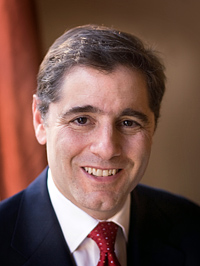A New Day at the FCC
The professional video industry's #1 source for news, trends and product and tech information. Sign up below.
You are now subscribed
Your newsletter sign-up was successful

Kevin Martin, the FCC chairman during the Bush years, is now long gone—relegated to the Aspen Institute, a halfway house for former commission chairmen. Julius Genachowski, once technology adviser to the Barack Obama presidential campaign, is his replacement. Leadership of the FCC could hardly be more different.
INTRODUCING GENACHOWSKI
Genachowski, 46, is an Internet whiz who helped engineer Obama's amazing use of the 'net for his presidential campaign. He is personally close to the president. They play basketball together, and were classmates at Columbia University and Harvard Law School. They even served together on the Harvard Law Review where Obama was Genachowski's boss.

Julius Genachowski The new chairman's background is steeped in Internet technology. Watch out broadcasters, cable companies and telcos. This is a man who really understands where technology is headed. He got his hands dirty working as an executive at Barry Diller's IAC/Interactive, parent company for Ticketmaster, Match.com and the Home Shopping Network. He was a venture capitalist, investing in social networking sites including MyGameMug and MPowerPlayer, the mobile game distributor.
Genachowski has also been around the FCC, politics and government. He worked as general counsel to former FCC Chairman Reed Hundt, he clerked for Supreme Court Justice David Souter, and worked as an aide for Sen. Charles Schumer, D-N.Y.
During the presidential campaign, Genachowski put together a detailed technology and innovation plan that expressed support for "net neutrality" protections; media-ownership rules that encourage more diversity; and the expansion of affordable broadband access across the country.
ISSUES LIST
A key to Genachowski's FCC tenure is certain to be net neutrality. That means Internet service providers must not discriminate among users by slowing or blocking their traffic based on ownership. This is something that cable and telcos definitely don't want.
Also high on Genachowski's issue list is diversity of media ownership. He's the complete opposite of former FCC chairman Kevin Martin, who wanted to loosen the rules that allow broadcasters and newspapers to further consolidate ownership. Watch Genachowski lead efforts to de-consolidate media. This is something broadcasters and newspapers don't want.
Genachowski will make broadband access a top priority. Since Bush entered office, the United States has declined in broadband connections. The nation has fallen from fourth to 15th in broadband adoption in the world since 2001. But even that number cheats the issue since the former president defined broadband as only 200 kbps—far lower than other nations.
President Obama, before taking office, campaigned for boosting Internet access. It's part of his vast infrastructure program to improve the U.S. economy.
"We can get true broadband to every community in America through a combination of reform of the Universal Service Fund, better use of the nation's wireless spectrum, promotion of next-generation facilities, technologies and applications, and new tax and loan incentives," Obama said during the transition.
It's hard to believe, but half the people in the United States have no broadband connection at all. According to Internet for Everyone, a grassroots organization promoting Internet diversity, only about 40 percent of racial and ethnic minority households are connected, while 55 percent of non-Hispanic white household have service. Nearly 10 million of those without any connection live in rural areas. Genachowski has been a major advocate for improving Internet services for those rural residents.
WHAT'S THE COST?
Another area Genachowski will probably knock heads is over the cost of Internet access. U.S. cable and telco providers charge the eighth highest prices in the world for Internet connections. For example, Japanese Internet users pay about half the price for a broadband connection that's 20 times faster than what's commonly available here.
Genachowski's chairmanship will shift the winners and losers in U.S. communications. High-tech companies like Google, Yahoo and eBay should prosper. Internet sites including YouTube, Facebook, and other social media will also benefit. (Remember, Genachowski used Facebook and YouTube to organize Obama's campaign volunteers.)
"Julius is more equipped than anyone for the job in the FCC's 70-year history to actually understand fundamental dynamics of the market," Hundt told the Washington Post.
Expect from Genachoswki a relentless obsession to help the United States return to the global forefront of Internet and mobile technology. Expect to see an expansion of wireless technology, including license-free bandwidth that could lead to more innovation at lower cost. And expect to see new players bring broadband to the masses.
It's a new day at the FCC.
Frank Beacham is a New York City-based writer. Visit his Web site at www.frankbeacham.com and his blog atwww.beachamjournal.com.
The professional video industry's #1 source for news, trends and product and tech information. Sign up below.
Frank Beacham is an independent writer based in New York.

